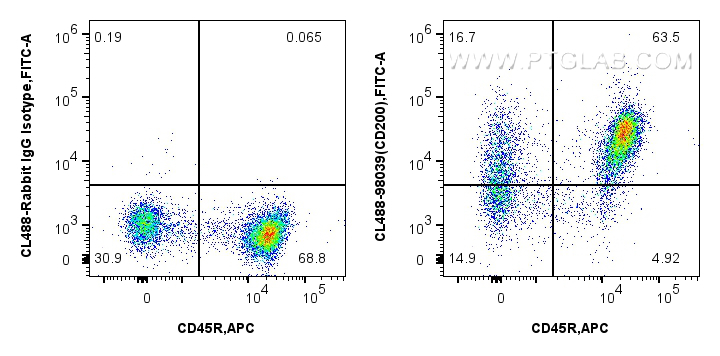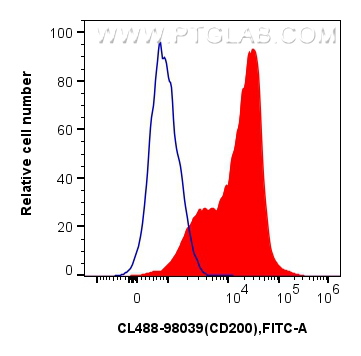验证数据展示
经过测试的应用
| Positive FC detected in | mouse splenocytes |
推荐稀释比
| 应用 | 推荐稀释比 |
|---|---|
| This reagent has been tested for flow cytometric analysis. It is recommended that this reagent should be titrated in each testing system to obtain optimal results. | |
| Sample-dependent, Check data in validation data gallery. | |
产品信息
CL488-98039 targets CD200 in FC applications and shows reactivity with mouse samples.
| 经测试应用 | FC Application Description |
| 经测试反应性 | mouse |
| 免疫原 | Fusion Protein 种属同源性预测 |
| 宿主/亚型 | Rabbit / IgG |
| 抗体类别 | Recombinant |
| 产品类型 | Antibody |
| 全称 | CD200 antigen |
| 别名 | OX2, Mox2, CD200 antigen, 240391A6 |
| 计算分子量 | 31 kDa |
| 基因名称 | Cd200 |
| Gene ID (NCBI) | 17470 |
| RRID | AB_3673383 |
| 偶联类型 | CoraLite® Plus 488 Fluorescent Dye |
| 最大激发/发射波长 | 493 nm / 522 nm |
| 形式 | Liquid |
| 纯化方式 | Protein A purification |
| UNIPROT ID | O54901 |
| 储存缓冲液 | PBS with 0.09% sodium azide , pH 7.3 |
| 储存条件 | Store at 2-8°C. Avoid exposure to light. Stable for one year after shipment. |
背景介绍
CD200, also known as OX2, is a type I transmembrane glycoprotein that belongs to the immunoglobulin superfamily (PMID: 3032785). It contains two extracellular immunoglobulin domains, a transmembrane and a cytoplasmic domain. CD200 is expressed on a variety of cell types, including thymocytes, B lymphocytes, a subset of T lymphocytes, follicular dendritic cells, neurons, and endothelial cells (PMID: 3032785; 10981966). CD200 binds to its receptor, CD200R, which is primarily expressed by myeloid and T cell lineage (PMID: 15187158). The CD200-CD200R interaction plays a role in immunosuppression and suppression of anti-tumor immune responses (PMID: 22020332).
实验方案
| Product Specific Protocols | |
|---|---|
| FC protocol for CL Plus 488 CD200 antibody CL488-98039 | Download protocol |
| Standard Protocols | |
|---|---|
| Click here to view our Standard Protocols |

